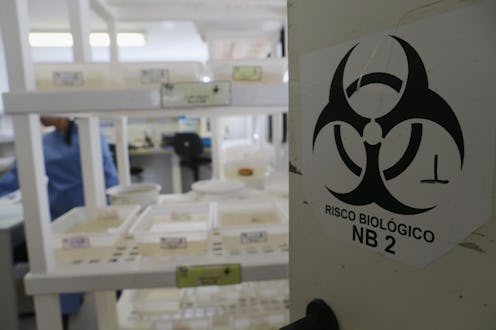News
The Zika Virus Could Impact Blood Donation
Public health agencies across the Americas and around the world are issuing warnings about the Zika virus, which is now spreading throughout several South American states, and into the United States as well. The World Health Organization has warned that infections are on a dramatic rise, forecasting that 4 million people could be infected with Zika before it's all said and done. That kind of an outbreak would raise some other questions about our public health systems, as well ― for instance, does the Zika virus make blood donation unsafe?
It's a question that's clearly on the minds of the Food and Drug Administration, the agency tasked with overseeing the policies and rules surrounding blood donations. As Gillian Mohney detailed for ABC News, National Institute of Allergy and Infectious Diseases (NIAID) chief Dr. Anthony Fauci confirmed Friday that the FDA is deciding whether to change its policies, hopefully to prevent Zika-infected blood from getting into the donated supply. According to Fauci, there's a window of time in which the Zika virus is active in a person's bloodstream, and it's a matter of concern.
The FDA is looking at the issue of blood supply, blood donors and travelers. We know it’s in the blood stream very briefly, most people have cleared the bloodstream of the virus after about a week.
The clear upshot is that if someone donated blood within that week or so window while Zika was in their bloodstream, it could be a health hazard to whoever ultimately received it. As such, you'd think any new policy would have to center around a donor's recent travel history ― if you've just returned from a place where Zika has been surging, then you'd have to wait several weeks to make sure you'd cleared the danger zone.
That's how Canada has responded to the outbreaks, at the very least. As Elizabeth Church detailed for The Globe and Mail, Canadian Blood Services Chief Medical and Scientific Officer Dana Devine affirmed that screening for possible Zika infections was the right thing to do, although she did emphasize that the chances of someone contracting Zika from a contaminated donation are slim.
"We think it is the wise thing to do," said Devine, adding that getting Zika from blood is "really pretty tough, but not impossible."
While the Zika virus is not hugely dangerous or life-threatening in most cases ― the Centers for Disease Control (CDC) say that only about one in five people infected with Zika will actually fall ill, and it generally passes in a few weeks without any need for hospitalization ― the worst potential impacts of it are still a matter of pending research. Specifically, Zika has been linked to thousands of incidents of birth defects in children in Brazil, and has also been linked to the autoimmune disorder Guillian-Barré Syndrome. It's mainly transmitted through mosquitoes, who'll suck up infected blood from one person and carry it to others.
At this point, it's premature to say why exactly Zika seems to be triggering these conditions, as it was previously thought to be a largely benign virus, if a nuisance. But until the relationship between the virus and these conditions is more clear, there are some obvious, rational areas of concern ― what if a pregnant woman required a blood transfusion, for example, and the blood she received contained Zika? The CDC has already made its concerns regarding pregnancy and Zika clear, advising pregnant women against traveling to Zika-afflicted regions (so far, predominantly in South America).
Simply put, even though more research is needed to figure out whether there's a causal link between Zika and these kinds of dire, far-more-serious afflictions, sometimes you have to think ahead and prepare for what might end up being the case. And besides, even at bare minimum, if the Zika virus were only what it was thought to be months ago ― a sore, feverish, headache-inducing infection that wasn't terribly serious in the long run ― you'd rather be safe than sorry, right?
